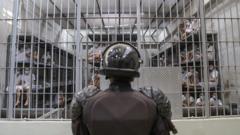A wave of anxiety envelops international students at U.S. colleges as recent detentions and visa revocations, often linked to pro-Palestinian protests, raise fears of targeted crackdowns and repression of dissent.
Rising Tensions on U.S. Campuses as Foreign Students Face Visa Revocations

Rising Tensions on U.S. Campuses as Foreign Students Face Visa Revocations
Students fear detention amid a crackdown linked to pro-Palestinian protests, leaving colleges across the nation on high alert.
In the last few weeks, U.S. colleges have seen a significant rise in anxiety among international students after plain-clothes agents began detaining students linked to pro-Palestinian protests. Videos of these high-profile arrests have circulated on social media, revealing the harrowing experiences of students who, without facing criminal charges, were forcibly taken to detention centers. The lack of transparency surrounding these incidents has created an atmosphere of fear, with more than 1,000 foreign students reportedly having their visas revoked or altered as part of what appears to be a broader crackdown endorsed by the Trump administration.
Internationals on campuses from elite Ivy League institutions to major public universities have expressed concerns, with many fearing they could be targeted next. A student at Georgetown University has resorted to carrying a card outlining their constitutional rights, while others report distressing behavior, such as avoiding leaving their homes. Universities are also feeling the repercussions, as various researchers abroad reconsider returning to the U.S. due to the increased risk associated with their ties to activism.
While some visa cancellations are linked to criminal records or minor infractions, many of those affected have openly participated in protests supporting Palestine, which has drawn ire from officials. Secretary of State Marco Rubio claimed that numerous visas have been revoked, emphasizing that those connected to antisemitic sentiments or harmful actions against Jewish students on campuses would be penalized. However, students assert they are merely expressing their political views about the ongoing Gaza conflict and U.S. allegiance to Israel.
Noteworthy cases include Badar Khan Suri, a postdoctoral fellow arrested near his home, and Columbia student Mahmoud Khalil, detained while awaiting deportation. These incidents have incited controversy, as critics argue that such actions obstruct students' freedoms and violate constitutional rights. Signs of solidarity have emerged on campuses, highlighting the tensions surrounding free speech amid governmental pressure.
Simultaneously, the federal government has targeted institutions as well, most recently withholding over $2 billion in funding from Harvard University for non-compliance with demands seen as infringing on academic freedom. Underlying this crackdown is a concern for U.S. national interests, as the administration seeks to quell dissenting voices and control campus environments.
As students brace for uncertainty, fears over potential immigration enforcement have intensified. Light-hearted backing from university faculty has raised alarm among students who remain unsure about their safety, with many now taking precautions against sudden detention. This frightening landscape has prompted a collective consciousness among international students as they navigate their educational pursuits while questioning the future of their status and safety in the U.S.



















